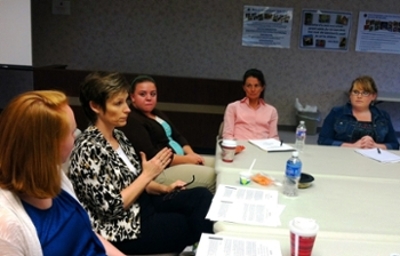Bridging the Gap between Classroom and Community
Ethical Reasoning in ActionBy Erin Phillippi ('08M)
Making the jump from learning in the classroom to acting ethically in the real world can be difficult, perhaps even more so for health and human services professionals. Emily Akerson, coordinator of Clinical and Interprofessional Programs for the Institute for Innovation in Health and Human Services, and Yvonne Frazier, program manager for Healthy Families Shenandoah County (HFSC), recognized the challenge in making that jump and decided to provide ethical reasoning training for the students and professionals participating in HFSC, their Shenandoah County-based community engagement program. HFSC is a home visit organization that educates new parents in difficult socioeconomic circumstances about healthcare and healthy child development as they work to prepare their children for kindergarten.
To better meet the needs of these families, HFSC works with many community partners including social services, hospitals, and schools to give interns from JMU the opportunity to work with professionals in the field and to build relationships with the people being served. When developing a rapport with these young families or when sharing information between agencies, service workers often face ethical conundrums, but the grant program developed for HFSC by Akerson and Frazier gave human services workers and interns alike the chance to meet together for six monthly sessions to discuss ethical decision making and its impact on their personal and professional lives. Akerson and Frazier hoped that these sessions would serve as a space for group problem solving that could help with issues commonly faced by health and human services professionals like stress and exhaustion. The grant would also improve learning opportunities for students and collaboration between agencies.
"Having always considered myself to be an ethical person, it was a good exercise that pushed me to consider choices that have to be made in difficult situations and what factors are at play in those decisions.”
The project kicked off with a meeting led by Dr. Bill Hawk and Dr. Lori Pyle of the Madison Collaborative: Ethical Reasoning in Action who met with a group of services professionals and interns to lay the ethical reasoning groundwork for the rest of the sessions. After that initial consultation, 18 direct service providers from various local agencies and 14 JMU interns from the departments of psychology, social work, and public health attended gatherings facilitated by Frazier to discuss how the Eight Key Questions related to the real-life situations they were facing. These meetings addressed one Key Question at a time to maximize opportunities for reflection and discussion. One participant noted that “I found the Ethical Reasoning sessions caused me to reflect on both a personal and ‘business’ level. Having always considered myself to be an ethical person, it was a good exercise that pushed me to consider choices that have to be made in difficult situations and what factors are at play in those decisions.” One of the student interns said that “As an intern, [she] really appreciated the opportunity to hear about ethical dilemmas that [her] mentors and other professionals had experienced. It was great to know that even professionals with years of experience make mistakes and have room to grow.”
While the sessions were intended to provide support for the professionals and educational opportunities for the students involved, the instructive possibilities of the grant program expanded far beyond the project’s original scope. Frazier presented some of the home visiting dilemmas the group explored with the Ethics in Health Care class at JMU during both the fall and spring semesters, while Akerson conducted interprofessional family review sessions for the Healthy Families staff. An intern who participated in the sessions also had the opportunity to share information about the Madison Collaborative and the Eight Key Questions with two classes of high school students. The far-reaching nature of the grant helped to build a network of service providers who feel that “…the concept of offering community partners the chance to join together, to explore how we can serve our clients, thoughtfully and within ethical dimensions, to be refreshing. The eight ethical considerations are another tool for working with our clients, offering perspectives besides the dictations of policy and procedures.” Thanks to Akerson and Frazier’s sessions, the 14 JMU interns who participated in this program feel comfortable thinking and acting ethically as they transition from the classroom to the real world.

